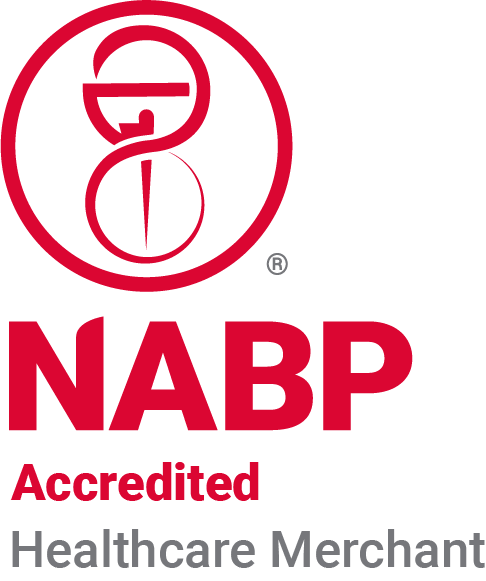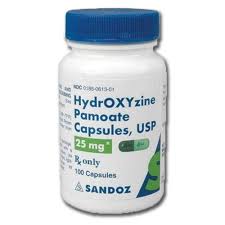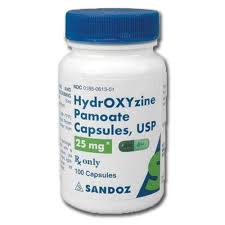Providing Quality & Trust || Clinic Website
Hydroxyzine Pamoate Capsule
Anda Inc.
$0.20 - $33.17
$0.20 Each
Detailed Description
Hydroxyzine
(hye-drox-i-zeen)
- Category: Antihistamine
- Other Names for this Medication: Atarax®, Vistaril®
- Common Dosage Forms: Veterinary: None.
Key Information:
- Use only products that contain hydroxyzine as a single active ingredient.
- Any other ingredients (eg, pain relievers, decongestants) found in human-label combination products can be toxic to animals.
- Antihistamines are normally used on an ongoing basis in animals that respond to them.
- They work better if used before exposure to an allergen (eg, pollens).
- Most common side effect is drowsiness or sleepiness, but this may be useful in itchy animals.
- Dry mouth, decreased gastrointestinal activity, and trouble urinating are possible.
- May be given with or without food.
- If your animal drools, vomits, or acts sick after getting it on an empty stomach, give with food or small treat to see if this helps.
- If vomiting continues, contact your veterinarian.
How is this medication useful?
Allergies cause histamine release, which causes itchy skin.
Hydroxyzine blocks histamine’s effects to reduce itchiness associated with allergies.
It can also be used as treatment for itching related to certain types of cancers (eg, mast cell tumors). Like other antihistamines, the response to this drug can vary between animals and be unpredictable, so your veterinarian may try several different antihistamines to see which one works best for your animal.
Hydroxyzine may be used with another antihistamine to improve its effects.
The FDA (U.S. Food & Drug Administration) has approved this drug for use in humans, butitis not officially approved for use in animals. The FDA allows veterinarians to prescribe products containing this drug in different species or for other conditions in certain situations. You and your veterinarian can discuss why this drug is the most appropriate choice.
How should this medication be given?
For this medication to work, give it exactly as your veterinarian has prescribed. It’s a good idea to always check the prescription label to be sure you are giving the drug correctly.
Uses/Indications:
Hydroxyzine is a first-generation antihistamine that may be useful in dogs and cats for the adjunctive treatment of histamine-mediated pruritic and allergic conditions (eg, urticaria, insect bite hypersensitivity) and atopy. It also has sedative and tranquilization effects. Guidelines for atopic dermatitis treatment in dogs state that antihistamines have modest efficacy; hydroxyzine should be given continuously (ie, daily) as preventative therapy before an acute flare.
The response to hydroxyzine, as with other antihistamines in dogs and cats, is individualized and not predictable. One patient may respond to one antihistamine but not another. Better results might be obtained if hydroxyzine is combined with chlorpheniramine, as this combination has been reported to be effective in reducing the clinical signs of canine atopic dermatitis in ≈1 of 3 treated dogs, and pruritus improved by more than 25% in 10 of 17 dogs.
This class of drugs may also be used as adjunctive therapy for mast cell tumors and to prevent local histamine release during surgical excision of mast cell tumors.
Because of its CNS depressant effects, hydroxyzine may also be of benefit as a mild sedative in small animal species.
What are the side effects ofthis medication?
Side effects that usually are not serious include:
- Sedation (sleepiness, fatigue) is the most common side effect. Most animals will become tolerantto this effect with time and will not get as sleepy when given the medication.
- Excitement. Occasionally, hydroxyzine causes some animals to become overly excited.
- Dogs: Muscle tremors (uncommon).
- Cats: Greater thirst, behavior changes (uncommon). Lack of appetite, low blood pressure (uncommon).
You don’t have to be overly concerned if you see any of these signs unless they are severe, worsen, or continue to be a problem. Contact your veterinarian if this happens.
Side effects that may be serious orindicate a serious problem:
- Dogs: Seizures. These are rare; contact your veterinarian immediately if they occur.
Precautions/Warnings:
Hydroxyzine is contraindicated in patients hypersensitive to it or its active metabolite, cetirizine. Because of its anticholinergic activity, hydroxyzine should be used with caution in patients with prostatic hypertrophy, bladder neck obstruction, severe cardiac failure, angle-closure glaucoma, prolonged QT interval, pulmonary diseases with minimal mucosal secretions, or pyeloduodenal obstruction. Avoid or use with caution in patients with a history of seizures.
Pediatric human patients are more susceptible to the adverse CNS effects of antihistamines; it is recommended to avoid use in neonates.
Hydroxyzine is a vesicant, and IV administration is contraindicated. In humans, hydroxyzine injection may only be administered IM, preferably into a large muscle, as local reactions (including significant tissue damage) may occur after IM administration. Tissue necrosis and abscess have occurred after SC injection.
If you have any other questions or concerns about this medication, contact your veterinarian or pharmacist.

Powered by nopCommerce
This site is running in live payment mode. Real payments will be processed.

